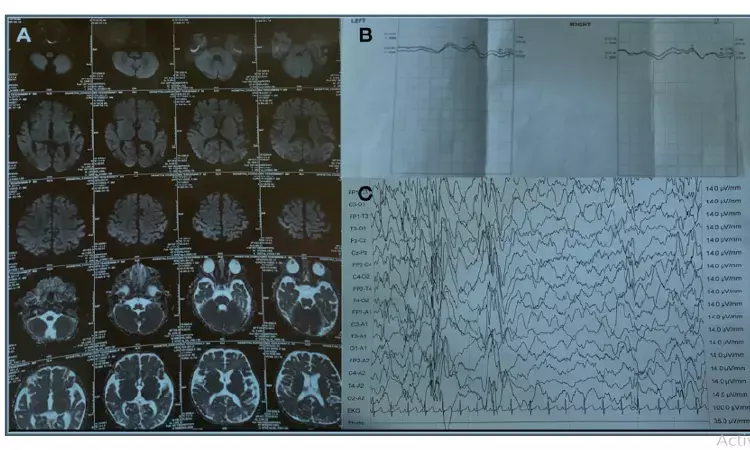- Home
- Medical news & Guidelines
- Anesthesiology
- Cardiology and CTVS
- Critical Care
- Dentistry
- Dermatology
- Diabetes and Endocrinology
- ENT
- Gastroenterology
- Medicine
- Nephrology
- Neurology
- Obstretics-Gynaecology
- Oncology
- Ophthalmology
- Orthopaedics
- Pediatrics-Neonatology
- Psychiatry
- Pulmonology
- Radiology
- Surgery
- Urology
- Laboratory Medicine
- Diet
- Nursing
- Paramedical
- Physiotherapy
- Health news
- Fact Check
- Bone Health Fact Check
- Brain Health Fact Check
- Cancer Related Fact Check
- Child Care Fact Check
- Dental and oral health fact check
- Diabetes and metabolic health fact check
- Diet and Nutrition Fact Check
- Eye and ENT Care Fact Check
- Fitness fact check
- Gut health fact check
- Heart health fact check
- Kidney health fact check
- Medical education fact check
- Men's health fact check
- Respiratory fact check
- Skin and hair care fact check
- Vaccine and Immunization fact check
- Women's health fact check
- AYUSH
- State News
- Andaman and Nicobar Islands
- Andhra Pradesh
- Arunachal Pradesh
- Assam
- Bihar
- Chandigarh
- Chattisgarh
- Dadra and Nagar Haveli
- Daman and Diu
- Delhi
- Goa
- Gujarat
- Haryana
- Himachal Pradesh
- Jammu & Kashmir
- Jharkhand
- Karnataka
- Kerala
- Ladakh
- Lakshadweep
- Madhya Pradesh
- Maharashtra
- Manipur
- Meghalaya
- Mizoram
- Nagaland
- Odisha
- Puducherry
- Punjab
- Rajasthan
- Sikkim
- Tamil Nadu
- Telangana
- Tripura
- Uttar Pradesh
- Uttrakhand
- West Bengal
- Medical Education
- Industry
A rare case of severe COVID-19 progressing to secondary WEST syndrome: a case report

Dr.Mallesh and his colleagues from Department of Pediatrics, Bangalore Medical college, Karnataka report an interesting case of severe COVID-19 and dengue infection presenting as ALERD(acute leucoencephalopathy with radiological diagnosis) progressing to WEST syndrome at follow-up.
A five month old infant presented with history of fever for past 5 days and altered sensorium with refusal of feeds on day 3 of illness. Infant was treated for severe dengue as supported by positive ELISA on day 5 of illness.
On day 10 of illness, child had hepatomegaly, ascites and bilateral infiltrates on chest X-ray, hence RTPCR of nasopharyngeal swab was done and tested positive for SARS-CoV2. MRI brain done in view of altered sensorium revealing diffusion restriction and edematous changes in sub-cortical white matter, hence a suspicion of acute demyelinating encephalomyelitis (ADEM).
Blood investigations showed anemia, thrombocytopenia, deranged liver enzymes and elevated CRP and procalcitonin. Infant met the criteria for cytokine storm as evidenced by elevated D-dimer, serum ferritin, serum LDH and IL-6.
Intravenous methylprednisolone 20 mg/kg/day was added for 5 days under the cover of antibiotics with pending culture reports as to tackle dual dilemma of suspected ADEM and Cytokine storm. On day 12 of illness infant threw 3 episodes of afebrile motor seizures requiring phenytoin and levetericetam. Following 5 days of IV steroid therapy, baby's sensorium improved with downward trend of inflammatory markers. Hence child was given 14 days of oral steroid followed by tapering dose. Repeat testing for SARS-CoV2 RTPCR was negative. Baby started taking breastfeeding on demand by day 20 of illness ,hence discharged on oral steroids along with levetericetam.
At follow up child had delayed motor development, with loss of previous attained milestones and repeat MRI brain showed clearing of previous lesions. BERA and VEP were normal for age. Over the next course of 5 months child had she developed repeated episodes of epileptic spasms with Electroencephalogram (EEG) features of hypsarrhthymia hence a diagnosis of West syndrome post encephalopathy was made in her. As child is on oral steroids and levetericetam with partially controlled symptoms, further treatment with adrenocorticotrophic hormone therapy (ACTH) to be considered.
Reviewing the course of illness, hypercytokinemia, typical MRI features of bright tree appearance on Diffusion weighted image (DWI) and follow-up MRI resolution, with post-encephalopathic sequelae of West syndrome, ADEM was superseded by its differential— acute leucoencephalopathy with restricted diffusion (ALERD) as the primary diagnosis in this child.
ALERD is a newly emerging clinical-radiological syndrome seen in children with post-infectious encephalopathy, needs to be differentiated from ADEM; may be a neurological complication of COVID-19 both of which cause hypercytokinemia.
In dengue endemic countries like India, coinfection with SARS-CoV2 poses a challenge in diagnosis and treatment as initial symptoms overlap with nearly identical lab parameters.
Author concludes-" All cases of documented dengue fever with shock and/or altered sensorium need to be tested for COVID-19, especially in this time of pandemic."
Source: Journal of Tropical Pediatrics
Dr Kamal Kant Kohli-MBBS, DTCD- a chest specialist with more than 30 years of practice and a flair for writing clinical articles, Dr Kamal Kant Kohli joined Medical Dialogues as a Chief Editor of Medical News. Besides writing articles, as an editor, he proofreads and verifies all the medical content published on Medical Dialogues including those coming from journals, studies,medical conferences,guidelines etc. Email: drkohli@medicaldialogues.in. Contact no. 011-43720751


